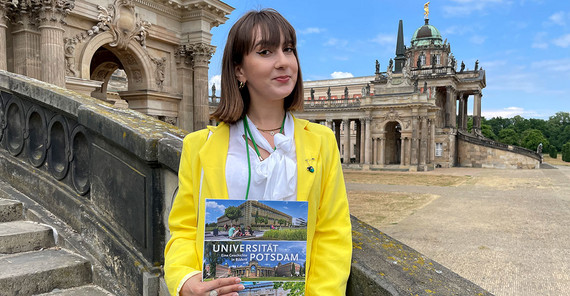“The internship was a unique opportunity for me,” says Patrizia Boi, who will soon complete her master's degree in political science at the University of Cagliari. “For my subject in particular, it is so important to look beyond Italy. This way I could gain valuable experience on a European level and test myself.”
This is precisely the goal of the EDUC-SHARE program, with which the Alliance aims to advance a common research agenda, knowledge transfer and citizen participation. “During the science journalism internships, students are supposed to deepen their skills in science communication and PR,” explains Nancy Wegner from the Potsdam EDUC team. "And, with the help of the materials they produce, report to the public on research findings and upcoming initiatives in this research area."
Boi saw the call for applications on her university's homepage, applied, and was selected. Among the broad range of research topics available at the EDUC universities, the one that most appealed to her was at the University of Potsdam: “Sustainable Changes: climate and resources.” “Everyone knows that climate change is causing big problems that are already affecting our lives,” she says. "And I think we should learn more about how science is working to solve these problems. It's a bit like the image of an iceberg: we see very little of what researchers are doing. I wanted to change that." To do this, she is developing several small social media posts for different channels at once, in which she reports on the work of Potsdam climate researcher Dr. Nathalie Lambrecht, who is a scientist working at the Potsdam Institute for Climate Impact Research (PIK). Lambrecht is particularly interested in the connection between climate change and health. “Especially in poor and particularly hard-hit countries, environmental pollution, extreme events such as heat and storms, but also malnutrition, are major problems whose severity is worsening,” says Boi. The Italian student had already familiarized herself with Lambrecht’s work before her stay in Potsdam. The internship consists of two parts, the first of which is a kind of digital mobility: After extensive preliminary research, Boi conducted a video interview with Nathalie Lambrecht and questioned her in detail about her work. With the help of the interview, she then developed the first social media posts. “I wanted to combine science and facts with emotions,” she says. For example, she asked Lambrecht to name three things or images that she personally associates with climate change. “I was also interested to see how she deals with working in a research field that everyone is discussing - and at the same time not getting any feedback on her own work.” Boi believes that climate research in particular needs to bring its findings to the people, and to enter into a conversation with them about them. She wants to be involved in this and has therefore decided to edit the interview for social media. Although posts, reels and tweets are rather small formats, the student knew that they required a lot of preparation, creativity and, above all, different approaches: "Facebook, Instagram, Twitter, LinkedIn - all the channels have different user groups," she says. “That's why the content also has to address them individually.” Photo collages and short video clips for Instagram, background information on climate change for Facebook - the posts had to be targeted. “I want to make sure that others can see the world through the eyes of the researcher.” Boi was able to test whether this really works at an online workshop on science communication from the initiative "Wissenschaft im Dialog" (Science in Dialogue), which is part of the internship. There, she not only gained insights and examples of what makes good science communication, but also had the opportunity to discuss the first PR materials.
In mid-June, Boi was finally able to take a closer look at Potsdam: She was a guest at the university for four days with the EDUC team, but also in the Department of Press and Public Relations and at all locations. “I received a very friendly and open welcome from everyone and took away a lot,” she says, “about EDUC, but also about how public relations and social media work is done here in particular. That helps enormously!”
Back in Cagliari, she will develop a second series of social media posts. She is certain that her impressions from her visit to the University of Potsdam will flow into it. The campaigns will then be published on the EDUC channels, among others, and thus contribute to more people knowing what topics are being researched at the Alliance.
“It is so important, especially for young people, to leave their comfort zone, look around and educate themselves elsewhere,” Boi sums up. “What they bring back can move their society forward - and make an important difference!”
More information:
https://www.uni-potsdam.de/en/educ/index/inform/further-projects/educ-share

